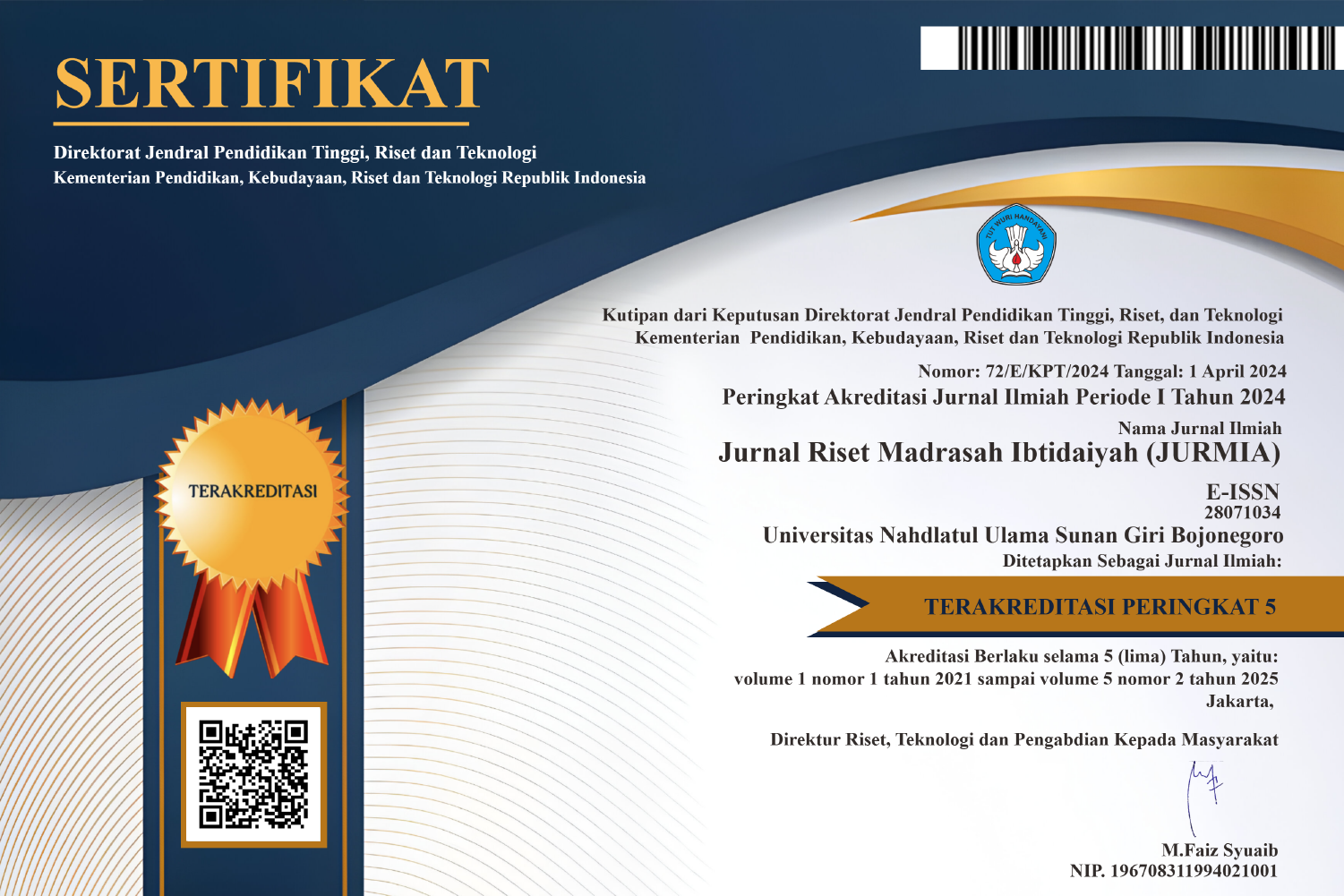Early Childhood Educators in Promoting Quality ECCE Students: A Case Study Jigawa State

DOI:
https://doi.org/10.32665/jurmia.v5i1.4067Keywords:
Early Childhood, Educators, Nigeria, Promoting Quality ECCE StudentsAbstract
This paper examines the Impact of Early Childhood Educators in Promoting Quality ECCE Students in Colleges of Education Jigawa State (Nigeria). This paper examines the importance of quality education which Nigeria as a nation needs a functional educational system that can equip learners with requisite knowledge, attitudes and skills to enable them relate and adapt successfully to the rapid socio- economic, cultural and political changes in the society. To achieve quality education, Nigeria Government has to recognize the role of Early childhood educators in promoting Quality education to students of Colleges of Education in Jigawa State (Nigeria). The paper recommends that, there is need for creation of conducive teaching and learning environment with the provision of appropriate, well-equipped and adequate laboratories, workshops, classrooms, libraries, staff offices, as well as good and adequate hostel and classroom accommodation, teaching and learning techniques in Colleges of Education of Nigeria.
References
A.A, O. (2022). Early childhood education (ECE) in Nigeria: A systematic analysis of policy in national local context.
Acosta-Tello, E. (2019). Reading aloud: engaging young children during a read aloud experience. Research in Higher Education Journal, 37, 1–7.
Akinrotimi, A. A. (2016). Challenges in implementation of early childhood education in Nigeria: The way forward. Journal of Education and Practices, 7(7), 33–38.
Cahyati, S. S., Tukiyo, T., Saputra, N., Julyanthry, J., & Herman, H. (2022). How to Improve the Quality of Learning for Early Childhood? An Implementation of Education Management in the Industrial Revolution Era 4.0. Jurnal Obsesi : Jurnal Pendidikan Anak Usia Dini, 6(5), 5437–5446. https://doi.org/10.31004/obsesi.v6i5.2979
Character Strengths Inventory for Early Childhood (CSI-EC). (2019). The Journal of Positive Psychology, 14(1), 86–102. https://doi.org/https://doi.org/10.1080/17439760.2018.1424925
College. (2021). College of Early Childhood Educators.
Dünya, B. A. (2020). Parents ’ Perceptions and Awareness about Reading Aloud to Preschool Children. 1(2), 175–188.
Ellingson, K. (2016). Interactive Technology Use in Early Childhood Programs to Enhance Literacy Development & Early Literacy Development for Children with Cochlear Implants. 3.
Etesike, C. (2021). Education as an instrument for security and national development: Challenges ahead. In A. O. Abobale, C. M. Ogbodo, & B. U. Maduewesi (Eds.), Contemporary issues in Nigerian education. Onisha: West and Solomon publishing company.
Gregoriadis, A., Papandreou, M., & Birbili, M. (2018). Early Childhood Educators’ Professional Development and Quality in Early Childhood Education and Care.
Gubuola, C. A. (2017). Quality control in early childhood education. British Journal of Education, 5(8), 63–72.
Hannon, P., & Nutbrown, C. (1997). Teachers ’ use of a conceptual framework for early literacy education involving parents Teachers ’ Use of a Conceptual Framework for Early Literacy Education Involving Parents. Teacher Development, 1, 405–420. https://doi.org/10.1080/13664539700200031
Holloway, S. L., & Pimlott-Wilson, H. (2014). Enriching Children, Institutionalizing Childhood? Geographies of Play, Extracurricular Activities, and Parenting in England. Annals of the Association of American Geographers, 104(3), 613–627. https://doi.org/10.1080/00045608.2013.846167
Howard, S., & Johnson, B. (2000). What Makes the Difference? Children and teachers talk about resilient outcomes for children “at risk.” Educational Studies, 26(3), 321–337. https://doi.org/10.1080/03055690050137132
Hu, B. Y., Fan, X., Wu, Y., LoCasale-Crouch, J., & Song, Z. (2020). Teacher–child interaction quality and Chinese children’s academic and cognitive development: New perspectives from piecewise growth modeling. Early Childhood Research Quarterly, 51, 242–255.
Lemea-Adoma, R. W. (2024). An overview of the management of early childhood education policy and planning in Nigeria. International Journal of Institutional Leadership, Policy and Management, 6(3), 288–297.
Mahadi, I. (2018). Education & crises of Development in Nigeria. A key note address. In Talla & M. H. Management (Eds.), Okegbile, As apara S.A.E ogungbe: Vol. E. 0. N. S (pp. 11–19).
Massaro, D. W. (2017). Reading aloud to children: Benefits and implications for acquiring literacy before schooling begins. American Journal of Psychology, 130(1), 63–72. https://doi.org/10.5406/amerjpsyc.130.1.0063
Musa, M. M., Abubakar, I. B., & Danladi, N. Y. (2017). Early childhood education: Development, challenges and prospects in Nigeria. International Journal of Education and Evaluation, 3(10), 47–58.
Musa, T. M. (2014). Absenteeism and truancy on academic performance of secondary school students in Ogun state, Nigeria. Journal of Education and Practice, 5(22), 81–88.
Nasiru, B. S., Musawa, T. S., Hassan, H. M., & Ejembi, E. A. (2019). Exploring the perceived factors that lead to substance abuse among youth in Northern Nigeria. Advance Research Journal of Medical and Clinical Science, 5(9), 15–23.
Nigeria, F. R. (2024). National Policy on Education Lagos. Fmi.
Ogunbela, G. K., Akinboboye, O. M., & Ogunbiyi, T. L. (2021). Tax Regime and Challenges of Scaling Up Tax Collection in Nigerian Informal Economy. Journal of Public Administration, Finance & Law, 20(1), 250–266.
Ogunsola, S. O., Fajemisin, E. A., Aiyenuro, A. E., & Tunde, A. A. (2013). Experiences and Projections for Drug Abuse Sensitization and Eradication Among Youths in South West, Nigeria. Journal of Alcohol Drug Dependency and Substance Abuse, 6, 018–26.
Omotuyole, C., & Okudo, A. R. (2024). Professional development of early childhood and language education teachers for sustainable development. IOSR Journal of Research and Method in Education, 4(2), 1–6.
Piaget, J. (1983). Piaget Theory of Cognitive Development” (P. Mussen, Ed.).
Rabia, W., A., S., & Gilani, N. (2023). Primary School Social Studies Curriculum: Comparison of National Curriculum (NC) 2006 and Single National Curriculum (SNC. University of Wah Journal of Social Sciences, 6(1), 71–80.
Rofiki, Moh., Nadrah, N., Hasanudin, C., Suttrisno, S., Ananda, R., & Siahaan, K. W. A. (2022). Hadith Learning Strategies in Early Childhood Education. Jurnal Obsesi : Jurnal Pendidikan Anak Usia Dini, 6(6), 7141–7152. https://doi.org/10.31004/obsesi.v6i6.3373
Rotshak, J. Y., S., M., & Podos, J. N. (2020). Analysis of early childhood education and integrated childhood development in Nigerian public schools. American Journal of Humanities and Social Sciences Research, 4(8), 275–281.
Sarkingobir, Y., Waheed, S. A., Abubakar, M., & Gilani, N. (2023). Plastic waste materials in a classroom environment: An assessment of nursery classes in Sokoto state, Nigeria. Pakistan Journal of Social Science, 43(2), 217–226.
Senawati, J., Suwastini, N. K. A., Jayantini, I. G. A. S. R., Adnyani, N. L. P. S., & Artini, N. N. (2021). The Benefits of Reading Aloud for Children: A Review in EFL Context. IJEE (Indonesian Journal of English Education), 1(1), 73–100. https://doi.org/10.15408/ijee.v1i1.19880
Suryana, D., Yulia, R., & Safrizal, S. (2021). Content Analysis of Al-Qur’an Science Integration in Children’S Animated Serial of Riko the Series on Hujan’S Episode. Ta’dib, 24(1), 93. https://doi.org/10.31958/jt.v24i1.2808
Thiagarajan, Sivasailam, Semmel, D. s, & Sommel, M. l. (1974). Instructional Decelopment For Training Teacher Of Exception Children. In A Sourcebook ERIC (pp. 1–193).
Vanbinst, K., Bergen, E., Ghesquière, P., & Smedt, B. (2020). Cross-domain associations of key cognitive correlates of early reading and early arithmetic in 5-year-olds. Early Childhood Research Quarterly, 51, 144–152.
Waheed, S. A., Gilani, N., & Baqir, A. E. (2022). The Outstanding Academic Success of Students from Underprivileged Families: Exploring the Inspirations, Community Culture and Challenging Situations. Journal of Educational Psychology and Pedagogical Sciences, 2(2), 1–11.
Yilmaz, R. M. (2016). Computers in Human Behavior Educational magic toys developed with augmented reality technology for early childhood education. Computers in Human Behavior, 54, 240–248. https://doi.org/10.1016/j.chb.2015.07.040
Zerga, A. A., Tadesse, S. E., Ayele, F. Y., & Ayele, S. Z. (2022). Impact of Malnutrition on the academic performance of school children in Ethiopia: A systematic review and meta-analysis. SAGE Open Medicine, 10(1), 1–10.
Downloads
Published
Issue
Section
License
Copyright (c) 2025 Baffa Bashari Ibrahim, Auwalu Abdullahi, Iliyasu Ibrahim Ringim

This work is licensed under a Creative Commons Attribution 4.0 International License.
 PDF Download: 174
PDF Download: 174










